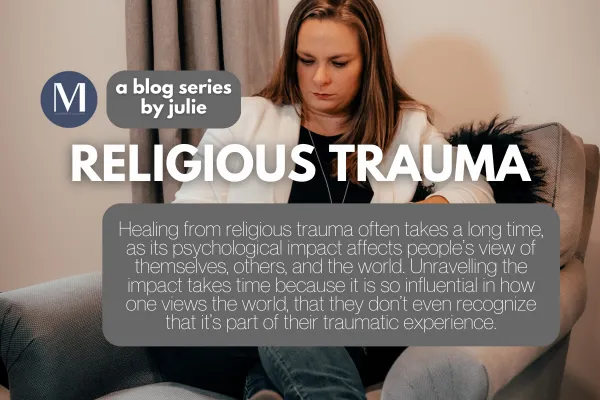the blog
A place for our team to share about topics they are passionate about, in hopes of allowing you to see and understand a bit more behind the faces on these pages.

Religious Trauma
Religious Trauma is a hot topic right now. Religious Trauma is the psychological, emotional, physical, and/or sexual harm that can come from being involved in a religious or spiritual group. This is often due to the teachings, practices, and experiences within the group. With that being said, this does not mean that all religious institutions or spiritual practices are traumatic or cause trauma. Many people find connection, peace, and fulfilment being a part of these groups. The trauma can develop when someone is subjected to abusive or harmful behaviours, words, spiritual practices, doctrines, or expectations - whether explicit or implicitly communicated - within a religious context.
There are various avenues Religious Trauma can present itself. Some of the biggest ways are that people often feel guilt, shame, fear or anxiety in response to not doing things the way that they’ve been taught too. Thinking outside the box or the institution’s way of thinking is looked down upon, and can be punished. This results in being isolated and ostracized. There is often an internal belief system that one cannot trust their own thoughts or feelings, and that they need to check in with those who are in positions of spiritual authority. There can be a dynamic created that encourages conformity. It feels like it’s the individual’s idea; however, they are made to feel that if there isn’t conformity, there is isolation. To ensure relational connection with others, one may be encouraged to conform by people of spiritual authority. One of the most common subtopics of Religious Trauma currently being addressed is Purity Culture. Many millennials were raised with Purity Culture and has caused a lot of damage to peoples’ sense of self and identity.
There can be a long lasting impact on individuals who have experienced or are currently experiencing Religious Trauma. There is a time when one starts to ask questions, and this often causes isolation and ostracization from their religious community. The loneliness and space often result in anxiety and depression as one is trying to find themselves, figure out who they are, and what they believe after they’ve started to unpack the trauma. In some cases it can result in Post-Traumatic Stress Disorder (PTSD), when the trauma has been severe, chronic or long lasting.
Healing from Religious Trauma often takes a long time, as its psychological impact affects people’s view of themselves, others, and the world. Unravelling the impact takes time because it is so influential on how one views the world, that they don’t even recognize that it’s part of their traumatic experience. Having a therapist, counsellor, or support group that understands religion and religious trauma is imperative as this type of healing looks different from other types of trauma. The unravelling must be gentle as the individual starts to explore thinking for themselves and trusting their own intuition and judgement.
If this sounds like something you’ve experienced and you’re feeling ready to unpack it, feel free to reach out. One of us would be happy to talk with you and explore what that healing journey looks like. If you’re not ready yet, that’s completely ok. It’s important that you take your time and make the decision that is best for you. Guess what? You can learn to trust your judgement and this may be the first step. Assessing whether this is something that you’re ready for or not is your choice. You get to choose.
Tune in for our next blog as we continue to explore different types of trauma.
Office Location: 1200 Brock Street South, Whitby, ON. L1N 4L9
© Marquis Counselling & Consulting | ALL RIGHTS RESERVED | TERMS & CONDITIONS | PRIVACY POLICY

